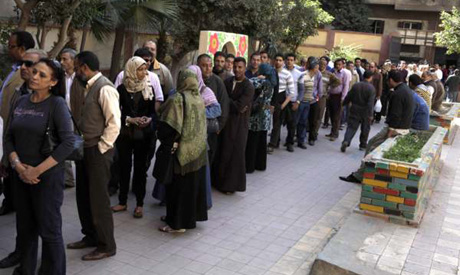
Egyptians queue to cast their vote during a national referendum, at a school in Cairo March 19, 2011. Egyptians flocked to the polls on Saturday in a historic referendum on changes to the constitution. REUTERS/Asmaa Waguih
While for most Egyptians the 19 March referendum on the constitutional amendments is the first time they ever vote, some recount to Ahram Online their previous attempts under Mubarak’s regime.
The machinations of the government had become so strong that although many opposition groups resigned to the inevitable outcome of the election some still participated - if only to reveal the fraud. However, after the egregious transgressions in the most recent 2010 elections all opposition groups publicly withdrew and condemned the electoral process a completely useless battle.
Several Egyptians who voted today recall their experience from when they voted under Mubarak’s rule.
Mohamed Waked says “I went to vote against Mubarak as president in the 1999 elections at the polling station closest to my university back then. After I voted no, I was not asked to stamp my hand with ink to assure that I would not vote again. When I asked how they would guarantee that I would not vote again elsewhere, the man assured me that I should not worry because Mubarak will win anyways. He told me that assuming I had voted “yes.” They couldn’t imagine anyone would bother to go to the polling station to say “no,” since everyone knew Mubarak would win anyway.”
Although there have been some reports of irregularities during the 2011 post-Mubarak referendum, most voters have been describing their experience in a positive light as the first democratic vote they have ever witnessed in Egypt. Most of them are struck by the number of voters showing up to cast their vote.
Foad, reporter, explains that he monitored the Zamalek polling station during the 2005 referendum over Hosni Mubarak’s constitutional amendments and says “within a time frame of 3 hours only 3 people showed up. When I went to cast my vote in today's 2011 referendum I had to stand in queue for hours, after which I gave up and went to look for a less crowded polling station. People in Zamalek were asked to leave and go elsewhere because too many people showed up to vote.”
In some polling stations, which witnessed logistical problems, voting hours for the Egypt 2011 referendum have been extended from 7pm by a full five hours: 12 midnight. It has also been declared that some stations will not close before all queued voters have voted.
Foad’s account of the empty 2005 referendum is related to the fact that most, if not all, opposition groups and parties had decided to boycott the 2005 referendum, arguing that it would be predictably rigged.
Egyptians may not have intentionally boycotted those elections but were simply apathetic from the lack of faith that their vote would count. According to estimates only 1 per cent showed up to vote in 2005.
In the 2010 parliamentary elections most of the opposition had declared it would boycott the elections during the first round, but after the ruling National Democratic Party won a sweeping 95 per cent and the opposition scored only an approximate three seats - the entire opposition withdrew before the second round. The Brotherhood, Egypt’s biggest and most organised opposition group didn’t even score one seat during the 2010 elections.
Tarek Shalaby says he had attempted to vote during the last presidential and parliamentary elections and said his attempts were like “throwing one’s vote in the trash.” On his Twitter account Shalaby wrote today “I 'voted' against Mubarak in '06, I 'voted' against constitution in '07, I 'voted' against the NDP last November. But now I'm going to VOTE,” hopeful that this referendum’s outcome will reflect the actual percentages of votes casted and not simply a rigged result.
Faith that their voice will be heard through the 2011 constitutional referendum is reflected by the numbers that have queued up at the different polling stations today. A supervisory judge from Ain Shams district says “this is the highest turnout I have ever seen in any election process I have supervised: more than the presidential, the parliamentary or any previous referendums.”
However, disappointment has hit many, despite the joy of obvious change, as some rigging attempts have been reported, especially in Upper Egypt where several reports from individuals who are monitoring the elections have alleged that there are accounts of voters intimidation and vote-changing.
Others have complained that organised Islamist groups have used religion to manipulate people’s decisions, arguing that if they vote against the constitutional amendments that article 2, which declares that Islamic law governs the judiciary, will be removed if the constitution is scrapped to start anew.
Still, no one has yet denied that this referendum is the first in Egypt’s history, as all previous referendums and elections have been considered null. Families and friends are taking pictures showing their pink-ink stained fingers to document their first “real” voting experience.
Short link: